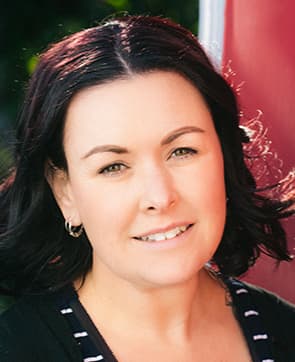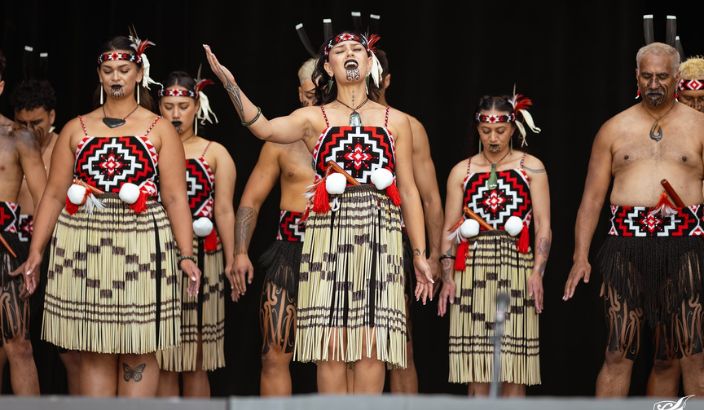Te Tauihu the people’s choice


Naia Awatea on stage performing at Te Matatini. <em>Photo: Te Matatini Enterprises.</em>
Te Tauihu (Top of the South) has been cast into the spotlight at national kapa haka festival Te Matatini, but as the planned hosts for the next event in 2027, its future in Whakatū is uncertain.
Local wāhine Naia Awatea and Bailee Tava went viral with their Te Tauihu group, Te Kuru Maratea, for a waiata (song) that collectively had them named People’s Choice at Te Matatini.
A record 55 teams took to the stage for Te Matatini o Te Kāhui Maunga 2025 in New Plymouth, making it the biggest festival to date. Twelve finalists performed on Saturday in front of a sold-out crowd of 15,000 at Pukekura the Bowl of Brooklands.
The new Kohine Ponika ‘People’s Choice’ award saw spectators surging to the Te Matatini app for vote their favourite kapa.
The inaugural winners are Te Kuru Marutea whose Waiata ā Tira wowed crowds and sent video clips across the world via social media platforms.
Former Waimea College student Bailee, and former Te Kura Kaupapa Māori o Tuia te Matangi ākonga Naia were the two soloists and say the past few days have been “overwhelming”.
Bailee, who is now based in Auckland, has been flying down every other weekend since October to practice with the rest of the group from across the region. “For me kapa haka is worth the commitment.”
The primary school teacher says they chose the waiata as it’s one that was gifted to them from the composer Latoya Leef.
“We’ve known that song for a very long time. It was written a few years ago so is second nature to us. But when it got the reaction it did, we realised, you know, people haven’t even heard this waiata before.”
She says the winning people’s choice was a win for Te Waipounamu (South Island).
“It’s really nice to see these kaupapa getting recognised and, especially with the new political take on te ao Māori, it’s really nice to see that people, and Māori, are still thriving.”
Bailee says a goal for her, and many others in the group, would be to perform on the Te Matatini stage “at home” in Whakatū.
Te Tauihu o Te Waka, the Nelson Marlborough region, was set to host the next Te Matatini festival in 2027, however, given the festival’s growth, there are concerns about their ability to host the event. As part of the competition, Te Mauri o Te Matatini is typically passed from the current hosts to the next. However, this did not happen.
Speaking to the media immediately after the prizegiving, Te Matatini chief executive says that ‘due diligence’ is still to be completed.
“Before every festival we do our due diligence and this time our due diligence has changed and it has changed because the festival has got so big, it has got massive,” he said.
“We have to have a look at infrastructure, we have to look at transportation, there are so many areas to look at.”
When asked if he had received any requests from another region to host the event, he replied, “No, we won’t go there.”
Nelson city councillor and Māori ward representative, Kahu Paki Paki, says the region had been working towards Te Matatini for years and thinks it has the capability and capacity to host the event.
He says withholding mauri was a way for Te Matatini to allow their processes and due diligence to be unaffected by the pressures of the competition.
“But it also allows the teams themselves to have their time in the sun so that the competition is focused around the winners, rather than it suddenly turning to where it’s going to next. Unfortunately for us, that means that we have to hold our breath.”
Te Matatini was an “exciting prospect” for the region, with the Taranaki competition expected to inject $27m into the local economy.
“That dwarfs some of the other events that we have.”
The confirmation wait was “problematic” for the region, but it was good for Te Matatini to do their due diligence.
“We want them to be assured that we have the competency and the capacity here in Te Tauihu, we definitely have the enthusiasm, to demonstrate that we’re behind this.”
Te Matatini would be hosted by the eight iwi of Te Tauihu.
“Everyone’s got a stake hold in this,” Kahu says.
“The shareholding of the economic and the social benefits for the event itself is huge, wide-ranging, and potentially intergenerational. This is something that the entire region needs to make themselves available to support iwi who will be hosting, because it will be iwi who will have their necks on the line, despite that the whole region will be tremendously benefited, economically and socially. It’s big mana.
“To make that commitment, we need the commitment from the organisers to allow us to really get the wheels in motion.”
He says Te Tauihu does not need to replicate Taranaki or Tāmaki Makaurau (Auckland).
“We need to do it our way. It’s not a copy and paste exercise, and that really is a good pathway to go down when we’re showcasing our region.
“Our point of difference is going to be that we will do things with Te Tauihutanga – the way of doing things here, our practices – to host our guests.”
